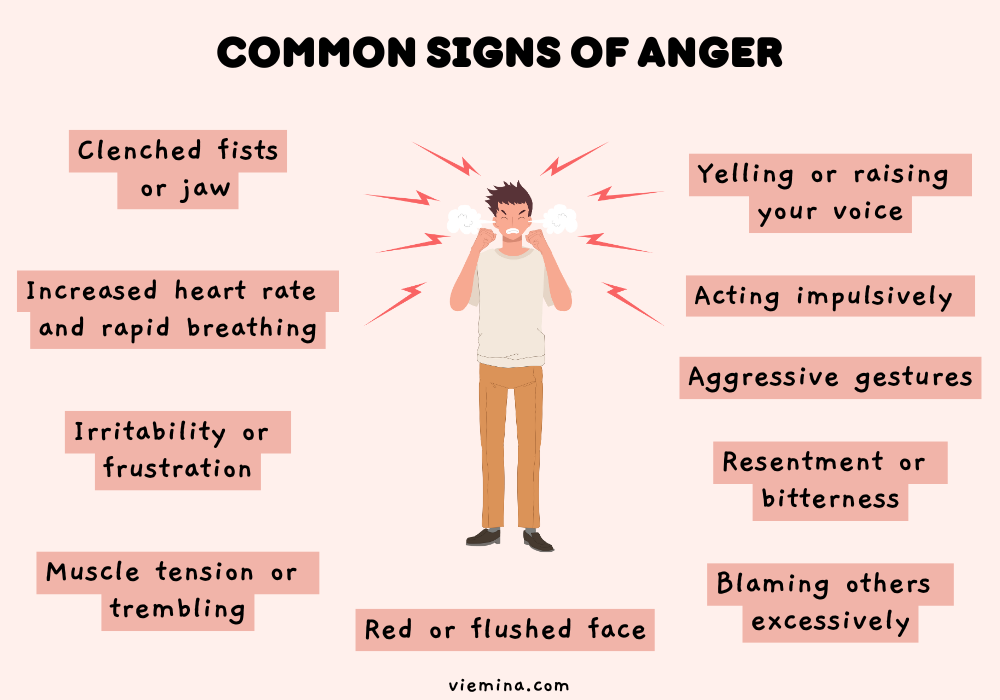How To Manage Anger?
Struggling with anger is something many people experience, so you’re not alone if you find yourself getting upset easily or reacting in ways you regret later. The good news is that managing anger is possible with the right strategies. Mistakes and setbacks are a normal part of life—they’re how we learn and grow. It’s easy to focus on failures and forget past successes, but holding onto mistakes isn’t healthy. Anger itself isn’t a “bad” emotion; it can even be constructive, like when you stand up for something you believe in. What truly matters is how you handle and express your anger. By pausing before reacting, understanding your triggers, and finding positive ways to channel your emotions, you can keep anger in check and use it as a force for good rather than letting it control you.
So, this article will share practical anger management strategies to help you stay in control when your emotions feel overwhelming.
1-Recognize warning signs:
Recognizing the early signs of anger is a powerful first step in managing it effectively. Pay attention to warning signs like a racing heartbeat, teeth grinding, sweating, a tight chest, trembling, or rising anxiety. You might notice changes in your behavior, like raising your voice, becoming irritable or defensive, or temporarily losing your sense of humor.
Acknowledge these feelings by admitting, “I feel frustrated” or “I’m angry.” Simply naming your emotions can help you take control and begin addressing the source of your anger before it escalates.

2-Remember, you are human:
We all make mistakes—it’s part of being human. Once you accept that imperfection is a natural part of life, you’ll feel more at ease with your journey. Mistakes are like an initiation into the shared human experience. Yes, you might stumble, say the wrong thing, or face unexpected challenges, but that’s life—it’s how we grow. Instead of letting mistakes define you, see them as opportunities to learn and improve. Each misstep proves you’re trying, evolving, and building your character.
Related: Embracing Imperfection: 9 Top Steps to Self-Acceptance
3-Find Out Why You’re Angry:
Anger happens for a reason, and sometimes it’s a normal reaction, like when you or someone else is treated unfairly. If you’re not sure why you just snapped, take a moment to reflect on your day. Try to pinpoint what might have triggered your feelings.
Here are some common reasons you might feel angry:
- You’re dealing with a lot of stress or pressure.
- Physical or hormonal changes That affect your mood.
- You feel frustrated with how things are going in your life.
- Challenges in your relationships, body, mind, or emotions are weighing on you.
Understanding what’s making you angry is the first step to managing your emotions and finding healthy ways to cope.
4-Get up and get moving:
Exercise is a powerful way to release that “I’m mad at myself” feeling bubbling inside you. A brisk walk, punching a bag, or even tackling a messy closet or garage can do wonders for your mood. Physical activity not only engages your body but also helps clear your mind and uplift your spirit. It’s a productive way to let go of anger and turn it into something positive!
Related: 25 Simple Ways to Boost Your Mood
Related: Why Hobbies Are Important? 12 Benefits
5 -Turn Self-Anger into Motivation:
Feeling angry at yourself can be a powerful motivator to improve. How? By channeling that energy into positive actions like exercise, relaxation, or healthy distractions, you can reset your mindset and create space for growth.
While some people prefer to tackle the issue head-on to overcome it, others may need a bit of time and distance to process their emotions—and that’s perfectly okay. Taking a mental break can clear your mind and provide the clarity needed to figure things out. Remember, it’s not about avoiding the issue but giving yourself the grace to regroup and move forward stronger.
Related: Why You’re Feeling Restless and Unmotivated
Related: Supercharge Your Motivation:5 Essential Tips
6-Step Back and Take a Pause:
When you’re angry, it’s tough to handle things helpfully. If you feel yourself losing your temper, take a step back and give yourself some time to cool off. Stepping away lets you calm down so you can approach the situation more calmly and effectively later.
Related: How To Improve Mental Clarity? 16 Ways to Achieve It
Related: 10 Easy Tips For Becoming A Calmer Person
7-Take a 100-Second Timeout:
It might sound simple, but this trick works wonders for anger management. Spend just 100 seconds focusing on something completely unrelated to what’s upsetting you. Distract yourself with another activity, and you’ll find it much easier to keep your cool.
8-Talking to Someone:
One of the easiest anger management strategies is to talk to someone you trust—a friend, family member, or trusted adult. Sharing your feelings can help lighten the emotional charge, offer fresh perspectives, and remind you that you’re not alone.
9- Practice rest (relaxation)techniques:
Relaxation techniques like deep breathing, yoga, or meditation are awesome anger management strategies. They help you calm down, clear your mind, and feel more confident, making it easier to deal with your anger and stress. If you make a mistake or feel upset, find a quiet spot to breathe and relax—it’ll help you feel better and in control again!
Related: 7 Easy Ways To Improve Your Life With Meditation
10-The Power of Forgiveness:
Forgiveness is like a superpower for healing and feeling better. It helps you let go of bad feelings and move on. Whether you’re forgiving someone else or yourself, it can make a huge difference in your mood and life. It’s not always easy, but it’s the best way to feel lighter, happier, and more at peace.
Conclusion:
Mastering anger management strategies is essential for improving your well-being and relationships. It’s perfectly normal to feel angry sometimes, but the key lies in how you handle it. Choosing healthy ways to manage and express your anger can make all the difference in maintaining control and staying positive.








